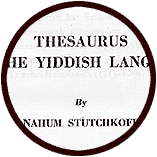A Life Devoted to Language
Born in Brok, Poland, in 1893, Nahum Stutchkoff had an early and unerring ear
for language. Speaking Yiddish, Polish, and Russian before he learned Hebrew
in Jewish day school, Stutchkoff picked up French and German after breaking
with his religious upbringing at 16 to join the Yiddish theater.
In 1923 he boarded a boat to America and disembarked two weeks later speaking
English, having read William Shakespeare, Mark Twain, and the Encyclopaedia
Britannica on the way over. But his greatest love was for the Yiddish language.
His Yiddish rhyming dictionary, published in 1931, won him great renown among
playwrights, intelligentsia, and the general Yiddish public.
With the ink on the rhyming dictionary barely dry, Stutchkoff began work on
a thesaurus of the Yiddish language -- a Herculean endeavor to which Stutchkoff
devoted increasing time and energy, while still writing, directing, and acting
in eight radio programs a week. In creating this repository of twelve centuries
of Yiddish culture and experience, Stutchkoff read virtually everything ever
published in Yiddish -- from religious treatises to literary works to daily newspapers,
which he cataloged on 3-1/2 x 5-inch index cards his children can recall jutting
from every pocket. This philological passion also served as the inspiration
for two radio shows: Mameloshn, literally "mother tongue" --
how native speakers refer to Yiddish -- and Vie Di Mame Flegt Zugn
(As Mother Used to Say).
Published in 1950, the 933-page Der Oytser Fun Der Yiddisher Sprakh
(Thesaurus of the Yiddish Language) inventoried the culture's every expression,
from its most ethereal allusions to its juiciest vulgarities. The tome contained
392 synonyms for the word "hit," more than 100 words and expressions
for "chutzpah," and seven pages of curses -- inverted blessings, mostly,
since cursing is forbidden in Judaism. (Example: "You should have a hundred
houses; in every house a hundred rooms; in every room twenty beds, and a delirious
fever should drive you from one bed to the next.")
Arguably the greatest one-man lexicographical accomplishment of all time,
his thesaurus was a final, emphatic statement on the wealth of Yiddish, made
at the moment the language heaved its last great secular sigh. After completing
the thesaurus, Stutchkoff immediately embarked on his final lexicographic undertaking:
a Hebrew thesaurus. Begun shortly after the establishment of the Jewish state,
it marked an important moment in the modernization of the Hebrew language. He
worked on it through his last days as a patient at the Brooklyn Jewish Home
for Chronic Diseases, his one-time sponsor.


